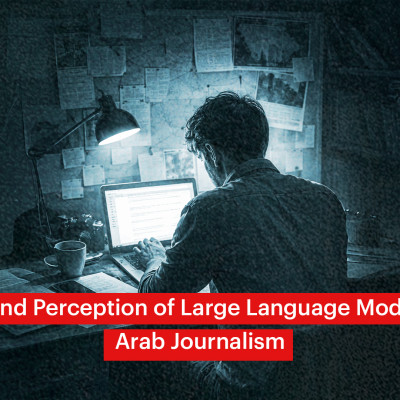Mohamed Emamis an Egyptian journalist and researcher residing abroad.
Economic Disinformation in Egypt: Manipulating Figures and Risking Investment

In a world governed by data and information, Egypt seems to be floundering in a fog of economic misinformation, which has significantly impacted both local and foreign investments and even forced some to cease operations.
In addition to the effect of disinformation on investor confidence and their ability to access accurate economic indicators, much of the data in Egypt is deliberately withheld by the government and regulatory institutions.
"Misinformation" and "lack of data" rank among the top ten risks facing the global economy through 2026, according to a survey published by the World Economic Forum in its Global Economic Risks Report 2024.
Forms of Economic Disinformation
The United Nations Educational, Scientific and Cultural Organization (UNESCO) defines disinformation as “deliberate attempts to confuse or manipulate people through delivering dishonest information to them.” This is evident in the Egyptian economy through misleading indicators, terminology, rhetoric, and the partial or complete withholding of data. Examples include:
- Misleading Indicators: The Egyptian government manipulates numerous economic indicators, creating an illusion of economic improvement. For instance, the Ministry of Finance announced a primary surplus (revenue exceeding expenditures, after excluding debt and interest payments) of approximately 416 billion Egyptian pounds (EGP) during the first nine months of 2023/2024 (with the dollar valued at 50 EGP at the time of writing). However, during the same period, the overall budget deficit reached about 760 billion EGP. This discrepancy contributed to an increase in domestic debt from 3.4 trillion EGP in 2017 to 6.86 trillion EGP by March 2023, and external debt rose from 46.5 billion USD in 2013 to 168.03 billion USD by the end of 2023, before dropping to 152.88 billion USD by June 2024. Media outlets claimed this debt reduction signaled the attractiveness of the Egyptian market to investors, but the improved figure stemmed from "non-recurring revenues from a single deal with the UAE and an IMF loan." A 2021 study highlighted inconsistencies in Egypt’s external debt data, noting that budget documents are often incomplete, excluding significant revenue and expenditure details — a fact the government acknowledged in 2023 concerning Suez Canal revenues.
- Misleading Discourse: The government and local media frequently employ misleading rhetoric to shape public opinion in line with their objectives, often at the expense of the public and investors. For example, when Egypt joined the BRICS economic bloc in early 2024, media outlets exaggerated the significance of the move, claiming it would "deliver a fatal blow to the dollar, save 35 billion USD annually, and that BRICS’ proposed currency is an economic powerhouse set to dethrone the dollar." Weeks after TV hosts predicted an alleged decline in dollar value, the Egyptian pound weakened against the dollar in March 2024, despite earlier claims predicting a decline in the dollar's value. This pattern of misleading predictions has repeated before every currency devaluation, prompting analysts to criticize the "simplistic and deceptive rhetoric that downplays major economic challenges and delays necessary tough decisions."
- Misleading Terminology: Egyptian officials often use economic terminology that misrepresents reality. For example, on October 9, 2024, Prime Minister Mostafa Madbouly suggested Egypt might "enter a war economy," a term typically reserved for nations engaged in actual wars. It implies increased defense spending, preparing shelters, and cutting costs in other sectors — none of which align with Egypt's circumstances as defined by the international classification of a state of war.
- Information Withholding: A major issue frequently highlighted by Egyptians, industry leaders, and investors is the lack of transparency. For instance, when Egypt announced the “Ras El Hikma” deal with the UAE in February 2024, social media was flooded with questions about its details, but official information was scarce, leading to widespread speculation. Experts often criticize the government for providing more detailed data to international institutions, such as the IMF, than to its own citizens, who must resort to these organizations for accurate information.
Economic Disinformation: Who Is Responsible?
Economic misinformation in Egypt stems from the involvement of various parties, including the executive and legislative authorities, supported by local media, amid a lack of regulatory oversight, silence from international organizations, and the uncritical acceptance of government data by others.
- Executive Authority: The state deliberately withholds significant data. In 2020, Egyptian President Abdel Fattah el-Sisi explicitly instructed a military official "not to disclose figures to avoid getting into trouble." Researchers have also noted the removal of annual development plan monitoring reports from the Ministry of Planning’s website after 2014. Additionally, the state disseminates misleading data, such as Sisi’s claim of completing "11,000 projects in four years at a rate of three projects per day" – figures that are contradictory and exaggerated. In 2018, he also announced countering "21,000 rumors in three months," averaging 233 rumors daily and nine per hour. The state also sometimes manipulates data collection methodologies by adopting or ignoring standards that deviate from global norms, such as in calculating poverty and unemployment rates.
- Legislative Authority: Several laws passed by the Egyptian Parliament restrict access to information. Law 180 of 2018, for example, includes vague terms that hinder journalists from accessing and publishing information. Furthermore, investment and corporate laws do not obligate companies to disclose information to journalists, despite constitutional provisions affirming public ownership of information and requiring the state to make it available with transparency.
- Regulatory Institutions: Key oversight institutions, such as the Central Agency for Public Mobilization and Statistics (CAPMAS) and the Central Auditing Organization (CAO), lack independence, according to the 2024 Financial Transparency Report by the U.S. Department of State. The leaders of these institutions often come from security or military backgrounds. In addition, a former CAO head was imprisoned in 2019 for criticizing corruption. His appointed successor was from the national security apparatus, and had previously overseen corruption investigations that ended in acquittals.
- State-Owned Companies: State-owned companies manipulate financial data, either concealing it or publishing false or inflated figures. The U.S. State Department’s transparency report criticized the lack of online publication of debt data for major state-owned enterprises. Misrepresentation was evident during the liquidation of El Nasr Co. for Coke, which reported profits while the state claimed losses despite the company ceasing operations in the fiscal year under review. Similarly, the state-owned Iron and Steel Company (82 percent owned by the state) misreported profits while hiding losses.
- Local Media: Local media contribute to economic misinformation by promoting inaccurate data or adopting misleading narratives. A 2019 Ipsos poll revealed that 78 percent of Egyptians encountered false or misleading information online, 67 percent via television, and 60 percent through print media. Most media outlets in Egypt are either state-owned or closely aligned with the government, which often restricts journalists' access to data, prevents publication, and bars entry to public events. The state also continues to block over 600 news and rights websites, despite constitutional guarantees for press freedom, freedom of expression, and publishing without censorship.
- International Organizations: Some international organizations rely on outdated or inaccurate data provided by Egyptian institutions. The IMF in particular, as well as other international organizations, have been criticized for incorporating Egypt’s official statistics uncritically in their reports, despite the country’s declining data accuracy and transparency indicators. This uncritical adoption effectively whitewashes government data, which then appears as verified statistics issued by international organizations.
International Indicators: Reputational Damage
Despite Egypt's announcement of an "economic reform" plan in 2016 in cooperation with the IMF, the country has ranked poorly on indices measuring data availability and quality, reflecting the level of international trust in its data, particularly economic data.
- Economic Freedom Index: Egypt ranked 146th globally in 2024, scoring 49.7 out of 100, down from 55.7 in 2021. This U.S.-based index evaluates economies across 184 countries based on rule of law, regulatory efficiency, integrity, and data availability.
- Corruption Perceptions Index (CPI): Egypt ranked 108th out of 180 countries and territories in 2023, with a score of 35 out of 100, according to Transparency International. This index uses various criteria to measure corruption, including the accessibility of data on public affairs and government activity.
- Open Data Inventory (ODIN): Egypt dropped six places to rank 130th in 2022, compared to 124th in 2020. Its data availability score fell from 153 to 165, with unpublished data increasing by 29%, while access to published data on the CAPMAS website remains restricted.
- 2024 U.S. State Department Financial Transparency Report: The report criticized the omission of debt data for major state-owned enterprises in Egypt; the lack of parliamentary and civilian oversight of military and intelligence budgets; non-compliance of the Central Auditing Organization with international independence standards, with its reports lacking objective findings and actionable recommendations; incomplete public budget documents, omitting executive agency expenditures; and the secrecy surrounding the Egyptian Sovereign Wealth Fund, including its funding sources and withdrawal policies.
Investment Losses and Exodus
Economic misinformation and Egypt's declining international reputation have cast a shadow over both domestic and foreign investments, leading to weakened industrial and private sectors, an expansion of military economic dominance, and growing investor reluctance or flight of investments.
- Industrial Sector: The Egyptian industrial sector has been negatively impacted by economic disinformation, characterized by a lack of information and transparency, as well as the government's promotion of unrealistic figures. The absence of accessible information and the difficulty of understanding the procedures to obtain it have resulted in the sector losing several opportunities for international funding, with those funds often being returned to international entities after the agreements expired without being utilized. Additionally, the process of allocating industrial land has faced numerous issues. A 2019 study by the Egyptian Federation of Industries highlighted key problems, including the lack of transparency and objectivity in allocation and pricing, as well as the absence of comprehensive information about available land, its prices, and the procedures for acquiring it. The government has also promoted unrealistic figures. For instance, in mid-2023, it announced a target of increasing industrial output to 4.3 trillion EGP (approximately 139 billion USD at the time) for 2023/2024. However, statistics for 2022/2023 showed that industrial output did not exceed 1.2 trillion EGP (24.3 billion USD), amid the shutdown or stagnation of around 12,000 factories.
- Private Sector: The sector suffers due to the lack of clarity and absence of data regarding government support directed toward state-owned companies, which benefit from "unfair advantages, such as tax exemptions and financing from state-owned banks." This is further compounded by the unavailability of information to the public and the lack of separation between commercial activities and other operations, making it difficult to evaluate their financial status and performance. Despite repeated government claims to increase private sector contributions to 65 percent of the economy within three years, a lack of reliable data prevents accurate measurement. The Procurement Managers Index (PMI) for November 2024 showed declining non-oil private sector activity for the third consecutive month, alongside reduced new orders since mid-2024, and a regression in private sector confidence about the future.
- Domestic Investors: Investors have increasingly opted to leave Egypt due to unclear conditions and a lack of transparency. In 2022, the family that owns the Egyptian company "Oriental Weavers" sold approximately 25% of its shares on the Egyptian Stock Exchange to an English company owned by the same family. Analysts attributed this move to a "lack of transparency and accurate information." A similar scenario unfolded in 2023 when Egyptian businessman Samih Sawiris announced he would not start any new projects in Egypt due to "exchange rate uncertainty and an inability to assess project profitability," stating he would invest in Saudi Arabia instead. Sawiris was not alone in this decision; Egyptians acquired 950 investment licenses in Saudi Arabia out of a total of 3,157 during the first quarter of 2024.
- Foreign Investment: The government obscured information regarding the inflow of sustainable foreign investments attributed to economic improvement, despite such investments being driven by political factors. It announced an increase in foreign direct investment to 46.1 USD billion in 2023/2024, compared to 11.4 billion USD in 2022/2023 and 8.9 billion USD in 2021/2022. These figures contradict reports from international organizations. Officials and media attributed the rise to Egypt signing its largest direct investment deal in history (Ras Al-Hikma) worth 35 billion USD, describing it as "placing Egypt at the heart of global investment movement and affirming the success of development plans." However, they overlooked that the deal was made "in light of political relations between the two countries, with revenues insufficient to resolve Egypt’s issues," and does not reflect the actual state of investment, which fell by 13.6% year-on-year in 2023, amounting to 9.841 billion USD compared to 11.4 billion USD in 2022.
- Venture Investment: The lack of available information about certain industries is one of the main reasons deterring venture investors from entering them. For example, Egypt’s recycling industry suffers from "the absence of detailed information and specific figures that would help assess the sector overall. Despite Egypt being a large market and the global demand for recycled products rising, the official recycling industry in the country remains in its infancy, making investors cautious.”
- Military Economy: The opacity surrounding the military's economic activities and the conflicting estimates of its contribution — officially stated at around 2 percent but estimated by experts to be as high as 40 percent — as well as the lack of disclosure of its resources, expenditures, or inclusion in measurement and accountability tools, subjects the public treasury to "significant losses." This stems from the absence of data about military projects, leading to "exemptions from taxes, customs duties, and transportation fees; access to subsidized energy and foreign currency at favorable rates; the use of state lands for free; conscript labor; and the concealment of actual costs." These factors make it difficult for private sector companies to compete.
- The Egyptian Stock Exchange: The government employs descriptions and terminology that negatively impact investment and the stock exchange. For instance, the slogan "Egypt is fighting terrorism," prominently used by state-affiliated and pro-government media after 2013, has adversely affected the country's image among investors. Despite this, officials have continued to use similar rhetoric. In October 2024, the Prime Minister stated that Egypt might enter a "war economy," a term that caused the stock exchange to lose 60 billion EGP (1.2 billion USD). These statements were described as "catastrophic for the country's investment plans," as they imply that the state could seize investments and projects. Although these statements are intended for a domestic audience, they fail to account for the fact that the world is watching, making their economic impact worse than an actual conflict.
In addition to the direct harm to investment in Egypt, economic misinformation distorts key metrics such as per capita income, inflation, unemployment, and poverty—data critical for any investor looking to study the market and formulate investment strategies.
Key Solutions: What Can Be Done
Economic misinformation is one of the biggest challenges facing investment in Egypt. Publishing false or inaccurate data directly undermines investor confidence and leads to poorly calculated decisions that expose both investors and the economy to significant risks. To address this issue, several measures can be taken:
- Government Communication: State leaders should provide clear and accurate statements about economic policies, avoiding ambiguous or contradictory remarks that might erode investor trust, particularly concerning state-owned company debt, the privileges granted to these enterprises, and economic indicators.
- Government Transparency: The government must cease issuing statements that embellish reality to avoid misleading both investors and the public. The U.S. State Department has urged Egypt to regularly publish accurate and comprehensive economic data, and to make that data easily accessible to the public and investors so they can objectively evaluate the market.
- Corporate Transparency: The state should provide information about its companies, particularly those owned by the military, through an annual report outlining progress in implementing policies. This step was recommended by the IMF to reduce the state's dominance in the economy.
- Legislation: A law on accessing information, which has been stalled in Parliament since it was mandated by Article 68 of the 2014 Constitution, should be passed. This could contribute to achieving higher levels of transparency and accountability, combating corruption, fostering development and investment environments, and addressing economic and social challenges.
- Oversight and Accountability: Transparency alone is not a panacea. Regulatory institutions must play a greater role in ensuring economic information flows to the right channels, holding those who publish misleading data accountable, and enforcing transparency and accountability. This is a recommendation also highlighted by the U.S. State Department.
- Independent Media: Support for independent media is essential, allowing it to provide economic analyses based on accurate data and reliable sources. The state must avoid monopolizing or relying solely on state-affiliated outlets and institutions. The Egyptian Journalists' Syndicate emphasized this point, stating, "There is no investment without information accessible to all and without restrictions."





